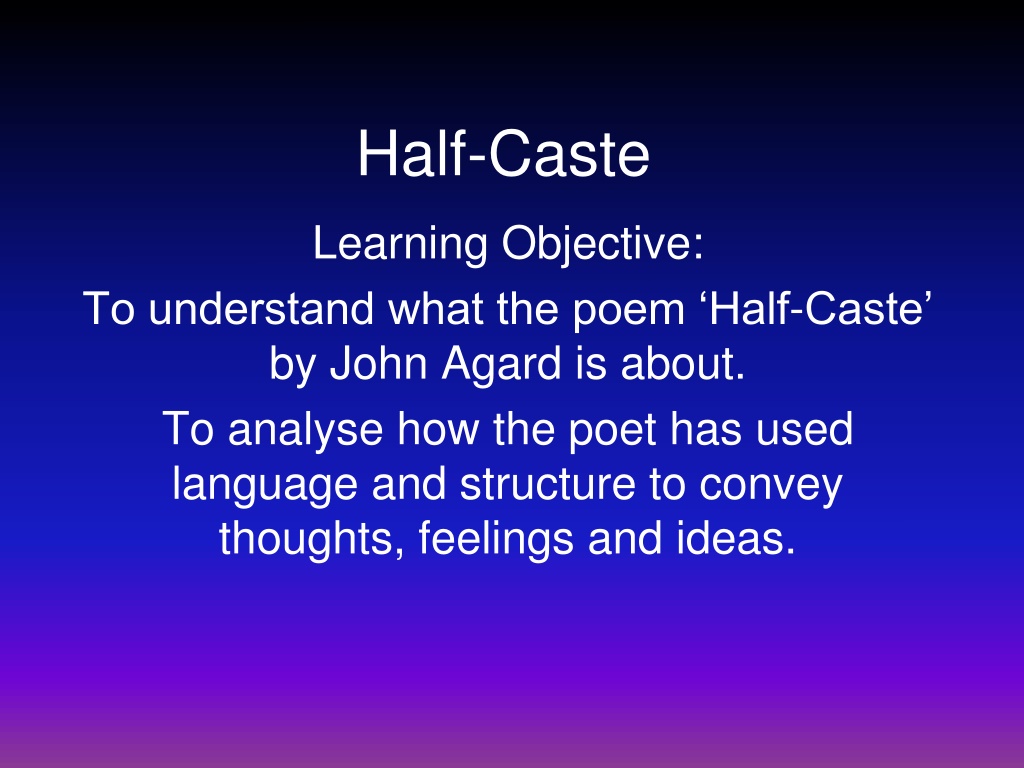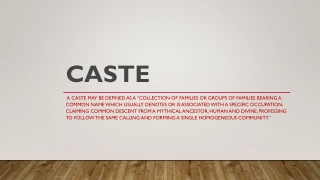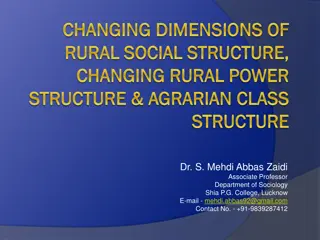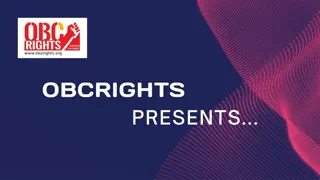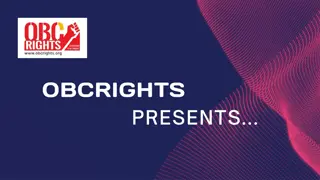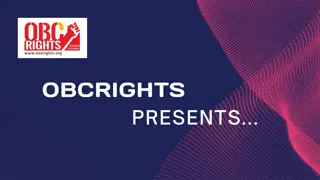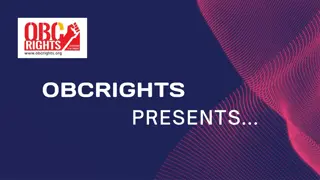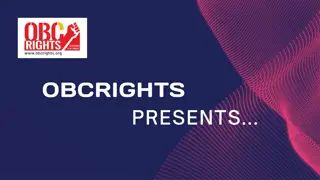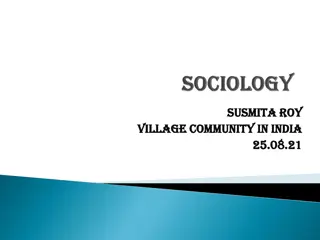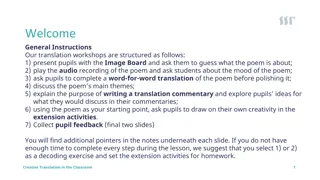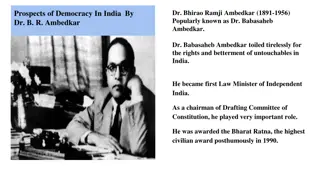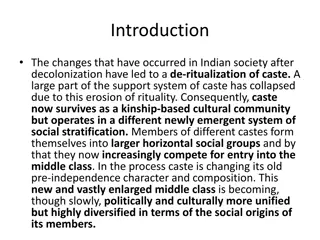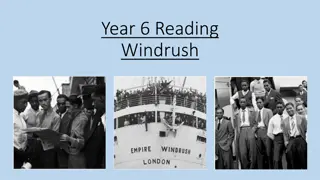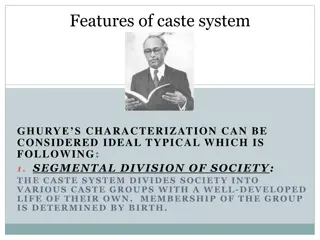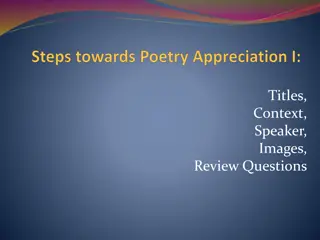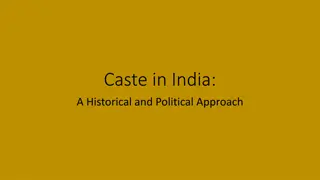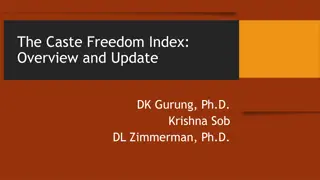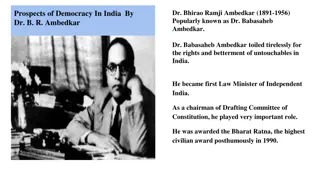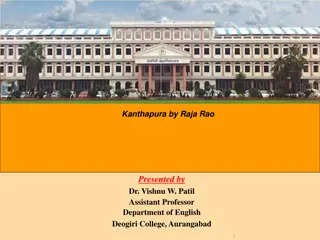Understanding John Agard's Poem "Half-Caste
Explore the meaning and themes of John Agard's poem "Half-Caste," analyzing how the poet uses language and structure to convey thoughts and feelings. Delve into the origins of the term "half-caste" and its implications, as well as Agard's unique approach to humor and breaking down racial boundaries through his work. Listen to the poet himself reading the poem and uncover the powerful techniques used, such as repetition and non-standard English, in delivering a thought-provoking message about identity and cultural diversity.
Download Presentation

Please find below an Image/Link to download the presentation.
The content on the website is provided AS IS for your information and personal use only. It may not be sold, licensed, or shared on other websites without obtaining consent from the author. Download presentation by click this link. If you encounter any issues during the download, it is possible that the publisher has removed the file from their server.
E N D
Presentation Transcript
Half-Caste Learning Objective: To understand what the poem Half-Caste by John Agard is about. To analyse how the poet has used language and structure to convey thoughts, feelings and ideas.
HALF-CASTE What does the term half-caste mean? Where do you come from if you are half-caste? How would you feel if someone called you a half-caste? HALF CASTE Less than whole Indian term for social class, the lowest of which is considered untouchable Less important Not properly formed From the Latin; Castus = pure Cast, made or formed
'The diversity of About the poet cultures here is very exciting'. I think humour can be very powerful. Humour breaks down boundaries, it topples our self-importance, it connects people John Agard came to England from Guyana in 1977. Like many people from the Caribbean, he is mixed race - his mother is Portuguese, but born in Guyana and his father is black. One of the things he enjoys about living in England is the wide range of people he meets: He doesn't like the view of racial origins, which is implied in the word 'half-caste', still used by many people to describe people of mixed race. The term now is considered rude and insulting.
The poem uses the following techniques: Repetition Repeat to reinforce an idea or image English that doesn t follow Non-standard English the normal rules Non-standard, dialect form Patois/Creole language of a language Important pictures and Key ideas/images thoughts
Listen to John Agard reading his poem (Active Teach/Resources/Clashes and Collisions/Half-Caste/
John Agard - Half Caste Poem opens apologetically or belligerently? Opening stanza is a joke Excuse me standing on one leg I m half-caste. Speaker stands on one leg because he is only half made/half a person Using the word caste as if it is cast i.e. made
Explain yuself wha yu mean when yu say half-caste yu mean when Picasso mix red an green is a half-caste canvas/ explain yuself wha yu mean when yu say half-caste yu mean when light an shadow mix in de sky is a half-caste weather/ well in dat case england weather nearly always half-caste in fact some o dem cloud half-caste till dem overcast so spiteful dem don t want de sun pass ah rass/ Tone is more demanding and blunt than the first stanza Written in his dialect (patois) with non-standard punctuation emphasising the fact that the speaker stands outside of society 5 10 Agard ridicules the notion of Half-caste by applying it to art and, notably, the British Weather explain yuself wha yu mean when yu say half-caste yu mean tchaikovsky sit down at dah piano an mix a black key wid a white key is a half-caste symphony/ 15 Agard puns the words half-caste and overcast for humour 25 20 30
Explain yuself wha yu mean Ah listening to yu wid de keen half of mih ear Ah looking at yu wid de keen half of mih eye an when I m introduced to yu I m sure you ll understand why I offer yu half-a-hand an when I sleep at night I close half-a-eye consequently when I dream I dream half-a-dream an when moon begin to glow I half-caste human being cast half-a-shadow but yu must come back tomorrow wid de whole of yu eye an de whole of yu ear an de whole of yu mind. The poet reprises his earlier joke/pun on a mixed race person being half formed: the half- caste uses only half of ear and eye, and offers half a hand to shake, leading to the absurdities of dreaming half a dream and casting half a shadow. The poet is asking/telling you to be more open minded and thoughtful both in terms of your attitudes and the way you speak 35 40 45 Once again the poet uses humour and absurdity to emphasise his view of the term 50 Final pun on the word half, like a joke, the poem ends with a punchline an I will tell yu de other half of my story.
Stanzas vary in length, possibly like the rambling of an upset speaker? Repetition gives a rhythm to the poem and emphasises the number of reasons that this term is stupid/racist What is Agard suggesting about the listener? What is the tone or mood of this poem? Angry, Unhappy, humorous? Patois and non- standard punctuation suggest this is a poem to be heard rather than read
What are the themes of this poem? Agard attacks the assumptions behind the term half-caste and ridicules it in the process Though the poem is light-hearted in tone, the argument of the last six lines is very serious We need to give people our full attention and respect Don t use the term half-caste when discussing the poem s meaning. Instead, use the term mixed race How is mixed race better than half-caste ?
Why did Agard write the poem? "This imposition of half, half, half on a person's total human complexity implies that some sort of 'purity' has been subverted. A child of mixed race is a tangible, loving expression of human beings from different cultural backgrounds getting together - that should be seen not as something threatening, but as something enriching..." Listen to John Agard talking about his own poem.
Questions Now answer the following questions in your books in full sentences.
Plenary Our lesson objectives were: To understand what the poem Half-Caste by John Agard is about. To analyse how the poet has used language and structure to convey thoughts, feelings and ideas. In your own words, answer the following questions: What is Half-Caste about? How do language and structure contribute to meaning?
